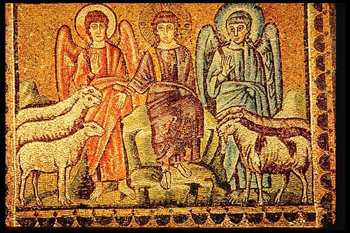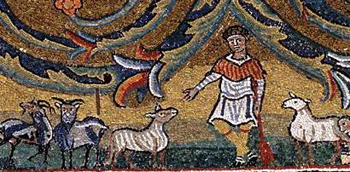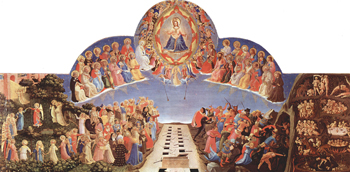From Our Archives
Debie Thomas, You Did It To Me (2020); Dan Clendenin, The Judgment of Injustice: Christ the King (2011); and Dan Clendenin, Global Joy for "All Ye Lands" (2005).
For Sunday November 26, 2023
Lectionary Readings (Revised Common Lectionary, Year A)
Ezekiel 34:11-16, 20-24
Psalm 95:1-7a
Ephesians 1:15-23
Matthew 25:31-46
This Week's Essay
Well, here we are again. It's been twenty-six weeks of "ordinary time" since the last church feast on Pentecost Sunday (May 28) — an entire half-year. On December 3 we'll begin a new church year with the season of Advent. But before then, on this Last Sunday of the liturgical year, we're confronted with the Last Judgment at the end of time.
The very familiar and deeply disturbing gospel this week from Matthew 25:31–46 about the sheep and the goats raises several questions. Is this a spiritual parable or a literal prediction? What does the judgment of "all the nations" mean? How should we interpret the language about "eternal fire prepared for the devil and his angels?" And notice how both the blessed and the cursed are surprised by their destinies.
These are important questions, but they shouldn't obscure an even more important truth. I can't think of anyone who said it better than James Forbes, the former pastor of Riverside Church in New York City: "Nobody gets to heaven without a letter of reference from the poor."
"I was hungry and you gave me something to eat," said Jesus. "I was thirsty and you gave me something to drink, I was a stranger and you invited me in, I needed clothes and you clothed me, I was sick and you looked after me, I was in prison and you came to visit me." To follow Jesus means to care for the needy. There's no other way. He says that our judgment in the next life will be based on how we treat the vulnerable in this life.
 |
|
Christ separates the sheep from the goats, 6th-century mosaic from Ravenna, the Church of Appolinare Nuovo.
|
A while back I read a book by two people who spent their lives struggling against "the insomnia of the scandal of poverty." It's called In the Company of the Poor; Conversations with Dr. Paul Farmer and Fr. Gustavo Gutiérrez (2013). I would even say that these are two of my Christian heroes.
Father Gutiérrez, now age 95, is a Dominican priest and theologian who split his time between his parish in Lima, Peru, where for fifty years he lived and worked among the poor, and teaching at Notre Dame University, where he held the John Cardinal O'Hara chair of Theology. In 1971 he published a game-changer of a book called A Theology of Liberation, which established his reputation as the "father of liberation theology," and made famous the controversial notion of a "preferential option for the poor."
Paul Farmer (1959–2022) was born the same year that Gutiérrez was ordained. He was a Harvard MD–PhD, clinician, tuberculosis specialist, author of numerous books and scholarly articles, recipient of a MacArthur "genius" grant, Professor of Medical Anthropology at Harvard Medical School, and founder of Partners in Health (2022 revenues of $335 million). His story is told by Tracy Kidder in the biography Mountains Beyond Mountains, which I promise is one of the most inspirational books you'll ever read.
When Farmer was in college, he read Gutiérrez and other liberation theologians. When he founded Partners in Health in 1987, he took his legal mission statement for incorporation directly from Gutiérrez: "Our mission is to provide a preferential option for the poor in heath care." His debt to Gutiérrez is further seen in his later book Pathologies of Power (2003).
Both men reject the many "explanations" for why so many people are so poor. It's not nobody's fault, or just the way things are. Poverty doesn't result from accidental forces of history. The deplorable disparities between the rich and poor aren't inescapable or necessary. Rather, they result from human agency, structural violence, economic policies, and corporate strategies. Many people are poor because of the choices other people have made. And yes, some people are poor because of their own poor choices.
When Gutiérrez coined the term "preferential option for the poor" fifty years ago, he said something not only about our human choices, but also about God's character. In his view, God is biased, even prejudiced. Far from being neutral or impartial, he argued that God plays favorites, you might say, by bestowing special favor on the dispossessed. And God asks us to do the same.
This isn't a new idea. It's a prominent theme throughout Scripture, especially in prophets like Amos and in poetry like Psalm 146. "Speak up for those who cannot speak for themselves, for the rights of all who are destitute," says Proverbs 31:8.
When the newly converted Paul met with the apostolic leaders in Jerusalem in order to seek their imprimatur, he says that "the only thing they asked us to do was to remember the poor, the very thing I was eager to do" (Galatians 2:10). For ten years, as he traveled among groups of new believers, Paul organized a famine relief effort for the people in Jerusalem. In Acts, Luke describes the "daily distribution of food" to widows. James says that "true and undefiled religion" is to care for widows and orphans.
 |
|
Sheep and Goats, Italian Mosaic, 1130's, the Apse, San Clemente, Rome.
|
A hundred years later, Tertullian wrote how God had a "peculiar respect" for the lowly, and that caring for the poor was the "distinctive sign" of believers. Even the pagan emperor Julian the Apostate (361–363), who vehemently opposed Christians and stripped them of their rights and privileges, acknowledged the Christian preferential option for the poor: "The godless Galileans feed not only their poor but ours."
In his book Charity: The Place of the Poor in the Biblical Tradition (Yale, 2013), Gary Anderson notes that Christian care for the poor isn't just a utilitarian act of social justice (Bill Gates does that), an altruistic act with no element of self-interest or expectation of reward (per Kant), and not even merely a sign of a believer's personal faith (per the Protestant Reformers). Rather, care for the poor is "the privileged way to serve God."
Peter Brown goes further. In The Ransom of the Soul; Afterlife and Wealth in Early Western Christianity (Harvard, 2015), he explores Matthew 19:21 and Luke 12:33 about storing up treasure in heaven. Jesus seems to say that there's a transfer of wealth from this life to the next — a spiritual reward for financial generosity. Social solidarity, compassion, and charity are all obvious reasons to help the poor, but Brown focuses on how alms giving also became a "purely expiatory action" for the atonement of sin, "to heal and protect one's soul." And yes, he acknowledges that such ideas are an "acute embarrassment" to secular moderns in general, and "abhorrent" to Protestants in particular.
We care for the poor not out of guilt, ascetic renunciation (although God calls some people to that path), some communist ideal that rejects private property, nor because the poor are virtuous. Rather, in serving the poor we care for our own souls by imitating the character of God himself. Only in heaven, said Mother Teresa, will we understand how much we owe the poor for helping us to love God like we should.
Care for the poor is one of the things that the church has done well. You find it all over the world by all types of Christians. We could give many examples, but consider four of my favorites.
 |
|
Jesus separating people at the Last Judgement, by Fra Angelico, 1432-1435.
|
In 2022, the Missionaries of Charity founded by Mother Teresa had 5,281 members in 130 countries who had vowed to serve the poorest of the poor. The Catholic Worker Movement founded by Dorothy Day and Peter Maurin in 1933 has over 185 communities that are committed to nonviolence, voluntary poverty, prayer, and hospitality for the homeless, exiled, hungry, and forsaken. In 1950, the Baptist minister Bob Pierce (1914–1978) founded World Vision with the words, "Let my heart be broken with the things that break the heart of God." Today World Vision is a billion dollar a year relief agency. Millard Fuller (1935–2009) was a self-made millionaire by age twenty-nine who renounced his wealth to follow Jesus. He joined an interracial community in Georgia called Koinonia Farms, and out of that context founded Habitat for Humanity that builds housing for the poor in more than 70 countries.
And what about the eternal separation of the sheep and goats in Matthew 25:31–46? I think we can say four things. First, judgment belongs to God alone and not to us. Second, maybe the love of God and justice become intolerable for some people — we can somehow lock the doors of hell from the inside. Further, divine judgment is not only retributive but also redemptive. The early church fathers Origen and Gregory of Nyssa even hoped for the redemption of satan.
Last, and most important of all, since divine judgment begins with God's people (1 Peter 4:16–18), we shouldn't wonder about all the bad actors in the world; we should examine our own selves. In the very last sentence of his chapter "Hell" in his book The Problem of Pain, CS Lewis put it this way: "This chapter is not about your wife or son, nor about Nero or Judas Iscariot; it is about you and me."
NOTE: See too the earlier book by Peter Brown, Through the Eye of a Needle; Wealth, the Fall of Rome, and the Making of Christianity in the West, 350–550 AD (Princeton University Press, 2012), 759pp. There's no one changeless or "master narrative" about wealth. Rather, Brown documents the various ways that the believers of this particular time and place grappled with the challenge of wealth, including radical renunciation by the super rich, the "anti-wealth" of the ascetics, care of the poor, the everyday generosity of ordinary believers, and, finally, the clerical stewardship of massive wealth as God's providential gift.
Weekly Prayer
Prayer of Mother Teresa and Brother Roger
Oh God, the father of all,
you ask every one of us to spread
Love where the poor are humiliated,
Joy where the Church is brought low,
And reconciliation where people are divided. . .
Father against son, mother against daughter,
Husband against wife,
Believers against those who cannot believe,
Christians against their unloved fellow Christians.A prayer jointly written by Mother Teresa and Brother Roger of Taize. From Kathryn Spink, Mother Teresa: A Complete Authorized Biography (New York: HarperCollins, 1997), pp. 152-153.
Dan Clendenin: dan@journeywithjesus.net
Image credits: (1) Brooklyn College; (2) At the Edge of the Enclosure; and (3) Wikipedia.org.





